People Hold Massive Protest Over Lack Of Water In Southwestern Iran
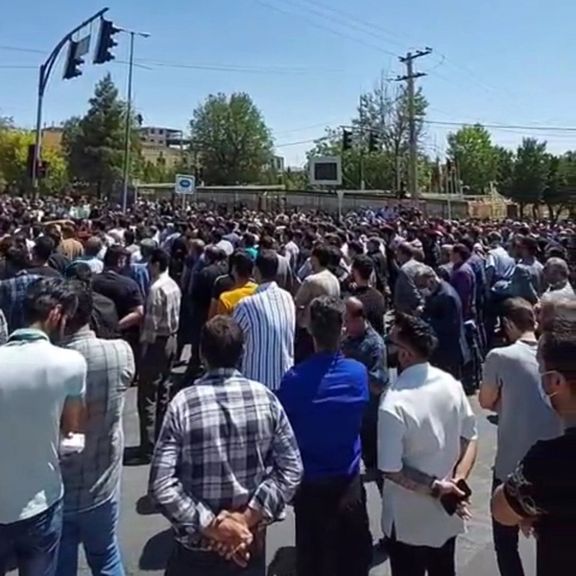
A large group of people in the city of Shahrekord in southwest Iran held a protest rally on Tuesday after nine days with no piped water.

A large group of people in the city of Shahrekord in southwest Iran held a protest rally on Tuesday after nine days with no piped water.
The demonstrators gathered in front of the governor’s office of Chaharmahal-Bakhtiari province amid a large presence of security forces and chanted slogans against the authorities, such as “Death to President Raisi” and “Down with the governor”.
According to Ahmad Rastineh, the city’s representative in the parliament, the problem stemmed from the recent flash floods in the region and the lack of any water treatment plant for the province.
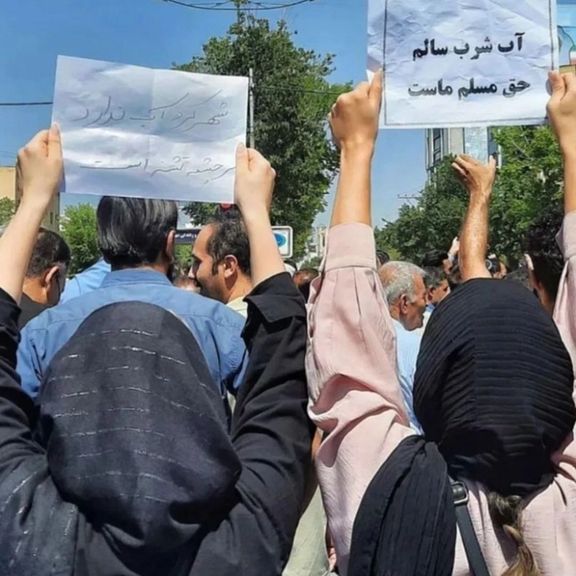
In addition to the provincial capital Shahrekord, water is cut in four other cities due to the recent floods and increased water turbidity.
In April, a group residents had held another protest rally against a project to transfer water out of the province, causing scarcity in their region. Protesters carried placards and chanted slogans threatening to take up arms against the ‘mafia’ behind the redistribution project.
Chaharmahal-Bakhtiari, a traditionally water-rich region in the Zagros mountains, has seen its water resources decline due to both drought and projects to irrigate other arid regions.
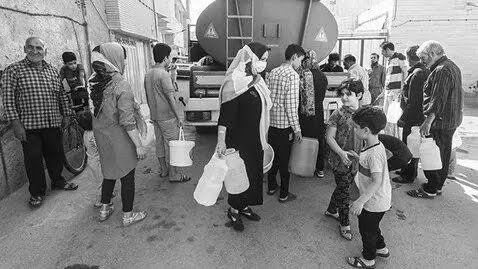
In recent years, many cities across the country were scenes of massive protests against the authorities’ mismanagement of water resources or harmful dam building and politically motivated diversion of rivers that have devastated agriculture and drinking water sources.
Iran has been suffering from drought for at least a decade and this year officials have been warning of a further decrease in precipitation.
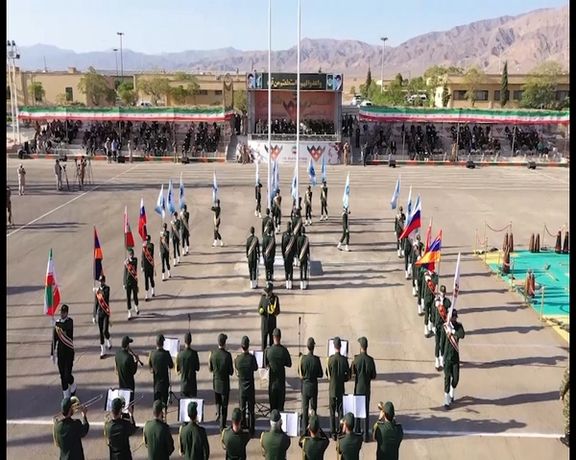
While Russia is holding joint military exercises with Iran’s Revolutionary guard and other Moscow allies in central Iran, Venezuela is also hosting sniper military exercises with these countries.
Both of these joint military drills, which started on Monday, August 15, are being held in Iran and Venezuela within the framework of Russia’s 2022 International Military Exercises, which was initiated by Moscow. Venezuela has been hosting the “Sniper Frontiers.”
“The goal, the spirit of these games is to unite cultures and peoples more” than to demonstrate military skills, said Venezuelan Defense Minister General Vladimir Padrino Lopez, adding that a delegation of 200 Venezuelan soldiers has also been sent to Russia to participate in other events of these games.
The annual event was launched in 2015 at the initiative of Russia, and about 30 countries including China, Iran, India, Cuba, and Myanmar have participated in the maneuvers.
Iran’s Revolutionary Guard also confirmed on Monday that it is holding joint drone exercises with Russia at the Kashan Air Base, adding that Belarus and Armenia are also partaking in the international UAV competitions.
Russia and Iran have expanded their strategic partnership since Russia invaded Ukraine in February 2022. Senior Russian and Iranian officials have met frequently in recent months to boost cooperation and sign economic and military agreements.
US State Department deputy spokesperson Vedant Patel reiterated on August 10 that Russian officials have undergone training in Iran in recent weeks as part of an agreement on the transfer of drones from the Islamic Republic.
An advisor to the Ukrainian President’s Office, Oleksiy Arestovych, said earlier in the month that Russia is using Iranian-provided military drones in its invasion of Ukraine, noting that Iran handed 46 drones over to Russia and that the Ukrainian government has already confirmed the use of these drones in combat in Ukraine.
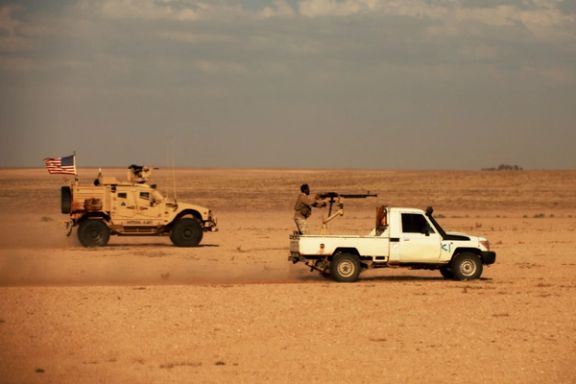
A drone attack hit a compound run by US troops and US-backed Syrian opposition fighters in possible revenge by Iran-backed militia over Israel-attributed strikes a day earlier.
The United States military said in a statement that the Monday attacks in eastern Syria had no casualties, adding, "Operation Inherent Resolve forces, in coordination with our Maghaweir al-Thowra partners, responded to an attack by multiple unmanned aerial systems in the vicinity of Al-Tanf Garrison," located near where the borders of Syria, Jordan and Iraq meet.
Maghaweir al-Thowra are US-backed Syrian opposition fighters, trained by US and coalition troops at Al-Tanf to counter Islamic State (ISIS) militants.
On Tuesday, rockets were also fired at the Green Village at the US-controlled Al-Omar oil field in eastern Syria. The oil field in Deir ez-Zur province is Syria’s largest and US personnel and the YPG/PKK militants are present there. “The attack injured two US service members, one was treated and released, while the other is under evaluation for traumatic brain injury,” The Special Operations Joint Task Force-Levant said.
There was no claim of responsibility for either of the attacks but a Syrian opposition source told Israel’s Kan public broadcaster that Iran is believed to have carried out the attacks, and the Wall Street Journal said, “The shelling follows a long-running series of attacks on US forces and local partners in Iraq and Syria carried out by Iran and its allied paramilitary groups in the region.”
On Sunday, a series of Israeli airstrikes hit Iranian targets close to Russia's main Syrian bases on the Mediterranean coast and areas near the ancestral home region of the Syrian president. Three servicemen were killed and three were wounded in two simultaneous attacks south of the province of Tartous, and another on the northeastern outskirts of capital Damascus.
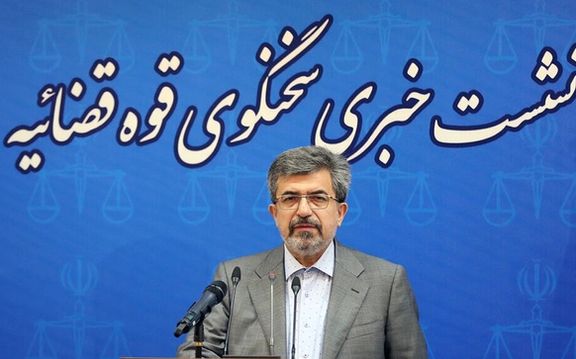
The Iranian judiciary says a Swedish citizen is detained in Iran on suspicion of espionage, adding that he might also face other charges.
In a televised news conference on Tuesday, judiciary spokesperson Masoud Setayeshi said the Swedish national was arrested on April 17 but the case is still under investigation.
“A number of documents were discovered from the detainee and are being investigated, and the preliminary investigation is confidential. Based on our clues, another charge may be brought against the suspect,” he said.
Iran’s Intelligence Ministry said late in July that it has arrested a Swedish citizen in Iran on charges of espionage. The suspect, whose identity remains unknown, had been under surveillance by the ministry during several previous trips to Iran because of "suspicious behavior," including contacts with "European and non-European suspects who were under surveillance in Iran.”
The ministry added the suspect visited different cities across Iran which are not typical tourist destinations, and that the Swedish person had also travelled to Israel before visiting Iran.
The arrest was announced as Iran has “strongly condemned” a Swedish court’s sentencing of former Iranian jailor Hamid Nouri to life imprisonment over executions of political prisoners in 1988.
Late in June, the Swedish Ministry of Foreign Affairs advised its citizens against traveling to the Islamic Republic due to security risks to foreigners.
Tehran is already holding hostage Iranian-Swedish academic Ahmadreza Djalali, who is on death row.
Iran has been accused of wrongfully detaining foreign and dual nationals on trumped up charges, effectively as hostages to extract concessions from Western governments.
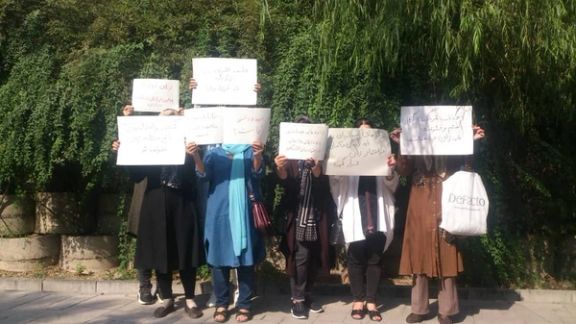
Some women's rights activists on Monday staged flash mobs in Tehran to demand information on the whereabouts of a woman arrested for defying forced hijab.
The women also protested government policies encouraging higher birth rates and limiting family planning.
Images of the flash mobs were shared on social media. The photos showed small groups of women who had covered their faces with placards to hide their identities in several areas of the capital Tehran.
“Where is Sepideh Rashno?” some of the placards the activists carried asked. Rashno is a 28-year-old artist, writer and editor and anti-hijab protester, whose ‘forced confessions’ were aired on state-run television on July 31. Many believe she was tortured and forced to denounce herself and other activists.
“Torture and forced confessions will not stop women’s movement,” another placard read.
She has reportedly been in detention at the IRGC ward of Tehran’s Evin Prison since her arrest on July 16 after a video of her quarrel with a woman enforcing hijab rules went viral on social media. She has not had any contact with her family or access to a lawyer since her arrest except for a short phone call.
Iran’s Supreme Leader claimed Wednesday that the anti-hijab movement is nothing but a Western plot, much like his depiction of all problems as plots by enemies.
On July 12, following a call by women’s rights activists for civil disobedience with the hashtag ‘No2Hijab’ social media exploded with dozens of videos and photo of women unveiling in public.
Supreme Leader Ali Khamenei in a speech in late July claimed that wearing the hijab is no impediment to Iranian women’s progress and accused the West of fueling the recent opposition to hijab to harm the regime without referring two women civil disobedience.
The government which is now fully controlled by hardliners has adopted a harsher than usual approach on hijab, amid economic crisis and hardship for tens of millions. Government and military officials have warned the population against disobeying hijab rules.
In the past few months, the morality police hijab enforcement patrols have detained many women, sometimes violently, on the streets and shut down shops, coffee shops and restaurants for not forcing their customers to comply with hijab rules.
In their flash mob action, activists also protested the government's population and family planning policies including a ban on contraceptives, vasectomy and tubectomy, and pre-natal screening for genetic abnormalities and congenital diseases.
“No to forced childbearing”, “A poverty stricken society needs welfare, not more children”, “Ending free pre-natal screening is violence against women”, and “Contraceptives must be provided to women for free and with no hassle”, other placards read.
Government family planning programs – including free contraceptives and vasectomies at governmental healthcare facilities opened in the 1980s – were gradually abandoned over the past ten years with those defending family planning dubbed enemy "infiltrators."
Iran's population has doubled from around 40 million in the early 1980s to 84 million now, but Khamenei has repeatedly stressed that it should rise to at least 150 million to avoid having an elderly population.
A new legislation designed to boost population growth passed by parliament in March outlawed tubectomy, vasectomy, and the free dispensation of contraceptives other than where pregnancy would threaten a woman's health. The health ministry has instructed family health clinics to advise women over-35 to wait only a year before again becoming pregnant and under-35s to wait six months.
While the new law does not include a ban on pre-natal screening, doctors have been advised not to encourage it.
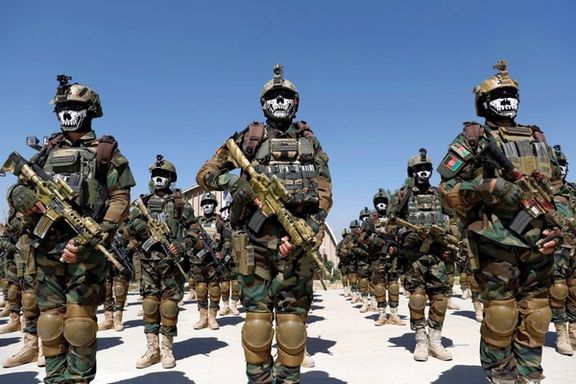
A new congressional report has revealed that thousands of Afghan military personnel -- including a number of elite US-trained Afghan commandos – have fled to Iran.
In a 120-plus-page report into the final days of the war in Afghanistan and chaotic US withdrawal from Kabul one year ago, Texas's Representative Michael McCaul, the top Republican on the House Foreign Affairs Committee, said the forces were trained in combat by US special operators, in some cases within the US, and "could be a serious national security threat to the US if they are captured or turn."
Noting that a ‘significant’ number of Afghan special forces and about 3,000 Afghan security forces crossed the border into Iran, the report warned that they could divulge sensitive US military training and intelligence to Tehran as they "know not only our tactics but who these elite military officials are," the report said, according to the Washington Free Beacon and Foreign Policy.
“Today, we’re still reeling from the damage that was done last August, including emboldening and empowering our foreign adversaries,” McCaul said in an interview.
The report concluded that in ongoing US efforts to safely evacuate Afghans who assisted the US government, “no special prioritization status has yet been granted to any former Afghan military personnel despite the security risks highlighted by the Biden administration’s own State Department.”
Mick Mulroy, a former deputy assistant secretary of defense and CIA paramilitary officer, said that the commandos and other special units had no option and “the only place you could go to escape the Taliban was Iran.”